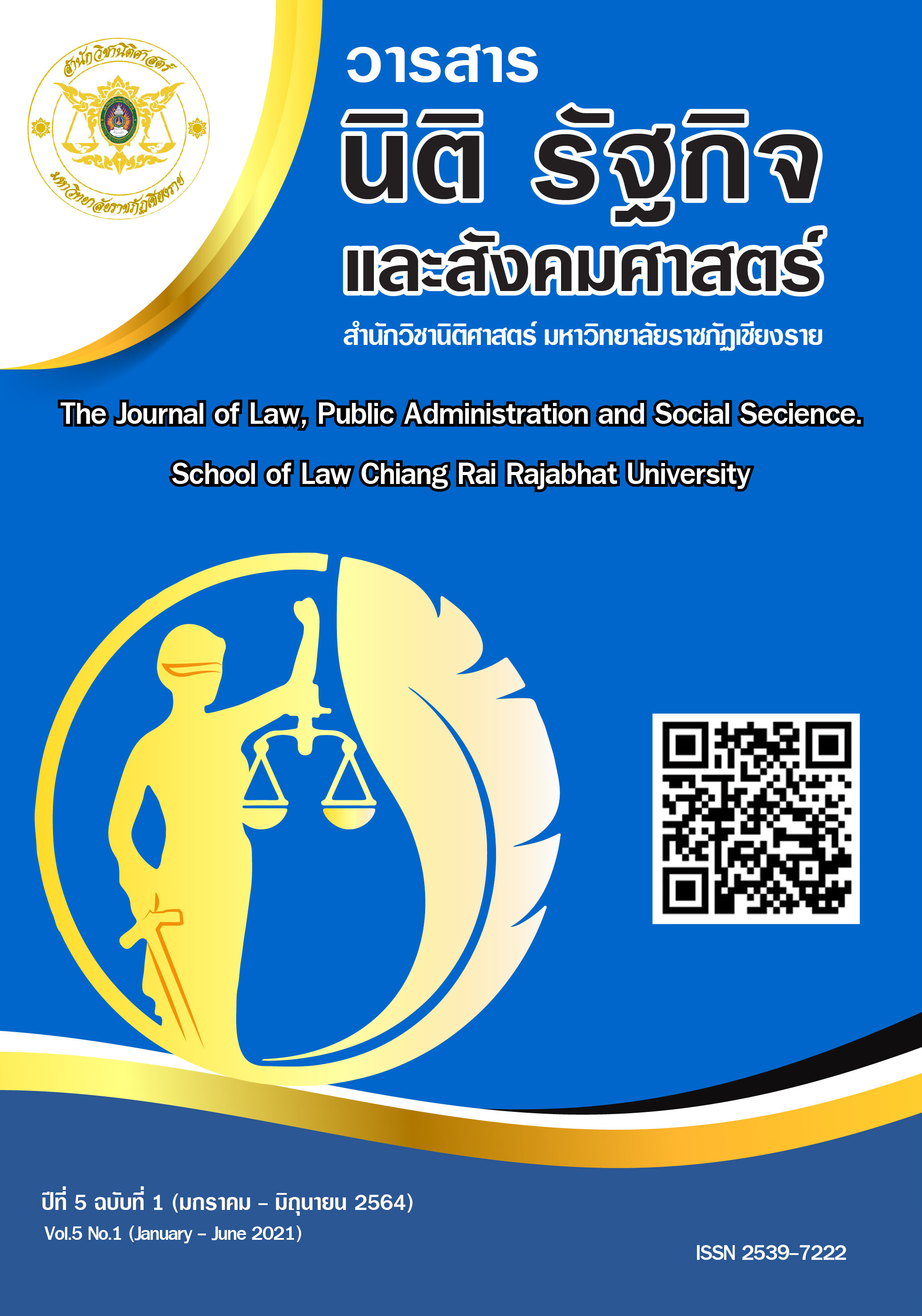วิพากษ์แนวทางการตีความการใช้สิทธิเรียกร้องของลูกหนี้เพื่อการบังคับคดีตามคำพิพากษาคดีแพ่งของศาล
Main Article Content
บทคัดย่อ
ประมวลกฎหมายแพ่งและพาณิชย์ได้บัญญัติบทควบคุมกองทรัพย์สินของลูกหนี้ไว้เพื่อคุ้มครองเจ้าหนี้ให้มีโอกาสได้รับชำระหนี้จากลูกหนี้ได้ การควบคุมกองทรัพย์สินของลูกหนี้ประการหนึ่งคือ เมื่อลูกหนี้มีสิทธิเรียกร้องแล้วลูกหนี้กลับขัดขืนหรือเพิกเฉยไม่ยอมใช้สิทธิเรียกร้องนั้นเป็นเหตุทำให้เจ้าหนี้เสียประโยชน์ กล่าวง่ายๆ ก็คือลูกหนี้ไม่ยอมทำให้ตนเองมีทรัพย์สินอย่างที่ควรจะมี กรณีเช่นว่านี้เจ้าหนี้สามารถใช้สิทธิเรียกร้องของลูกหนี้ฟ้องคดีแทนลูกหนี้เพื่อป้องกันสิทธิของตนได้ อย่างไรก็ดี การใช้สิทธิเรียกร้องของลูกหนี้เช่นว่านี้มีข้อจำกัดคือ หากลูกหนี้ได้ใช้สิทธิฟ้องคดีจนศาลพิพากษาให้ชนะคดีแล้ว แต่กลับไม่ยอมดำเนินการบังคับคดี เจ้าหนี้ก็ไม่สามารถใช้สิทธิบังคับคดีแทนลูกหนี้ได้เพราะไม่ใช่การใช้สิทธิเรียกร้องของลูกหนี้ ซึ่งในเรื่องนี้ศาลฎีกาก็ได้วินิจฉัยเป็นบรรทัดฐานเสมอมา ทำให้เกิดช่องว่างที่ลูกหนี้อาจใช้สิทธิไม่สุจริตและทำให้เจ้าหนี้เสียประโยชน์จากกรณีดังกล่าวได้
บทความวิชาการนี้จึงวิพากษ์แนวทางการตีความของศาลฎีกา และนำเสนอแนวทางการคุ้มครองเจ้าหนี้เพื่อไม่ให้เสียประโยชน์จากกรณีดังกล่าว โดยอาจเปลี่ยนมุมมองการวินิจฉัยหลักกฎหมายเกี่ยวกับการบังคับคดีใหม่เนื่องจากได้มีการแก้ไขประมวลกฎหมายวิธีพิจารณาความแพ่งเกี่ยวกับตัวผู้มีสิทธิบังคับคดีตามคำพิพากษาแล้ว อาจสามารถครอบคลุมถึงการใช้สิทธิเรียกร้องของลูกหนี้เพื่อการบังคับคดีตามคำพิพากษาของศาลได้
Article Details
เอกสารอ้างอิง
จี๊ด เศรษฐบุตร. หลักกฎหมายแพ่งลักษณะนิติกรรมและหนี้. พิมพ์ครั้งที่ 2. กรุงเทพ: คณะนิติศาสตร์ มหาวิทยาลัยธรรมศาสตร์, 2522.
จี๊ด เศรษฐบุตร. หลักกฎหมายแพ่งลักษณะหนี้. พิมพ์ครั้งที่ 20. กรุงเทพ: โครงการตำราและเอกสารประกอบการสอน คณะนิติศาสตร์ มหาวิทยาลัยธรรมศาสตร์, 2554.
รุ่งโรจน์ แซ่จ๋าว. “การซื้อขายสิทธิเรียกร้อง.” วิทยานิพนธ์นิติศาสตรมหาบัณฑิต คณะนิติศาสตร์ มหาวิทยาลัยธรรมศาสตร์, 2556.
วิเชียร ดิเรกอุดมศักดิ์. วิ.แพ่งพิสดาร เล่ม 3 (ฉบับปรับปรุงใหม่ปี 2563). กรุงเทพฯ: หจก.แสงจันทร์การพิมพ์, 2563.
สมชัย ฑีฆาอุตมากร. ประมวลกฎหมายวิธีพิจารราความแพ่ง การบังคับคดีตามคำพิพากษาหรือคำสั่ง ฉบับสมบูรณ์. กรุงเทพฯ: บริษัท กรุงสยาม พับลิชชิ่ง จำกัด, 2561.
สุนทร มณีสวัสดิ์. คำอธิบายประมวลกฎหมายแพ่งและพาณิชย์ หนี้. พิมพ์ครั้งที่ 3. กรุงเทพ: วิญญูชน, 2555.
เสนีย์ ปราโมช. ประมวลกฎหมายแพ่งและพาณิชย์ว่าด้วยนิติกรรมและหนี้ เล่ม 2 (ภาคจบบริบูรณ์). พิมพ์ครั้งที่ 4. กรุงเทพฯ: วิญญูชน, 2562.
โสภณ รัตนากร. คำอธิบายประมวลกฎหมายแพ่งและพาณิชย์ หนี้. พิมพ์ครั้งที่ 11. กรุงเทพฯ: สำนักพิมพ์นิติบรรณาการ, 2556.
เอมอร สวัสดี. “การใช้สิทธิเรียกร้องของลูกหนี้ตามมาตรา 233 ประมวลกฎหมายแพ่งและพาณิชย์ ในการยื่นขอรับชำระหนี้ต่อลูกหนี้คนที่สามในคดีล้มละลาย.” สารนิพนธ์นิติศาสตรมหาบัณฑิต คณะนิติศาสตร์ มหาวิทยาลัยธรรมศาสตร์, 2548.


